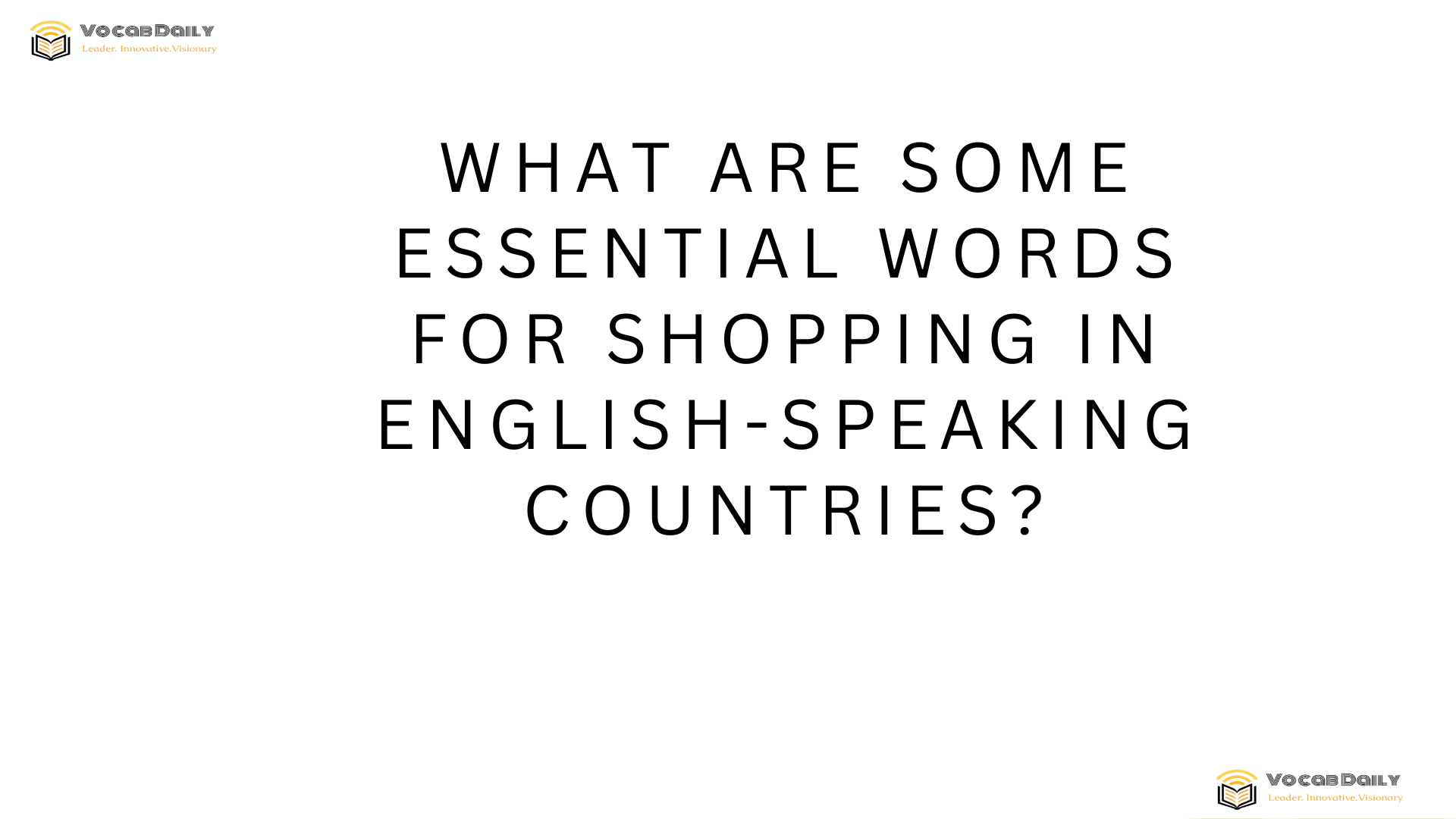Why Knowing Shopping Vocabulary is Important
When traveling to English-speaking countries, being comfortable with shopping vocabulary can make your experience smoother and more enjoyable. From markets and malls to supermarkets and boutiques, knowing essential words and phrases helps you communicate effectively with shopkeepers, understand prices, and navigate different types of stores confidently.
This guide will introduce some of the most important shopping-related words and expressions you might encounter, so you feel ready to shop like a local during your travels.
Common Types of Stores
Understanding the different store types in English-speaking countries is key to finding what you need fast. Here are some basic types of shops you should know:
- Supermarket: A large store offering groceries, household items, and sometimes clothing or electronics.
- Department store: A big retail store divided into sections like clothing, home goods, cosmetics, etc.
- Convenience store: A small shop open longer hours selling snacks, drinks, and everyday essentials.
- Boutique: A small, specialized shop selling fashion items or luxury goods.
- Pharmacy or drugstore: A place to buy medicine, health products, and sometimes beauty items.
- Market: Usually outdoors or in a designated area, offering fresh produce, crafts, and various goods.
Essential Shopping Vocabulary: Products and Items
When shopping, it helps to know words related to common products:
- Groceries: Food and household items bought regularly, such as fruits, vegetables, bread, and cleaning supplies.
- Clothing: Garments like shirts, pants, dresses, and jackets.
- Footwear: Shoes, sandals, boots, and sneakers.
- Electronics: Devices such as phones, laptops, cameras, and headphones.
- Accessories: Items like hats, belts, scarves, and jewelry that complement outfits.
- Cosmetics: Beauty products like makeup, skincare creams, and perfumes.
- Housewares: Kitchen tools, furniture, and home decorations.
Helpful Words for Price and Payment
Understanding pricing and payment terms will help you avoid confusion while shopping:
- Price: The amount of money something costs.
- Discount: A reduction in price, often during sales.
- Sale: A special event where prices are lowered.
- Tax: An extra charge added to the price (sometimes included, sometimes added at checkout).
- Receipt: A slip or proof of purchase showing the transaction details.
- Cash: Paper money and coins used for payment.
- Credit card: A plastic card that lets you pay electronically and then pay the bank later.
- Debit card: A plastic card linked to your bank account, deducting money immediately.
- Change: Money returned to you if you pay more than the price.
- Price tag: A label attached to an item showing its price.
Useful Phrases for Shopping Interactions
Here are common English phrases that can help you communicate clearly with store staff:
- “How much does this cost?”
- “Do you have this in a different size/color?”
- “Can I try this on?” (used especially in clothing shops)
- “Where is the fitting room?”
- “Is this on sale?”
- “Can I pay by credit card?”
- “Do you offer refunds or exchanges?”
- “Can I get a receipt, please?”
- “Is there a warranty on this product?”
- “Could you help me find…”
Different Shopping Experiences: In-Person vs. Online
Shopping vocabulary varies a bit depending on whether you shop in stores or online. Here are some additional words relevant to both:
- Checkout: The place or process where you pay for your items.
- Shopping cart or trolley: The basket or cart used to carry items while shopping.
- Delivery: The process of sending your purchased items to your home.
- Return policy: The store’s rules about returning items you’re unhappy with.
- Customer service: Assistance provided to shoppers before, during, and after purchases.
- Out of stock: When an item is not currently available.
- Backorder: A situation where an item is temporarily unavailable but will be shipped later.
Special Vocabulary for Food Shopping
If you are shopping for food or cooking ingredients, these words might come in handy:
- Fresh produce: Fruits and vegetables that are freshly harvested.
- Dairy: Products made from milk, such as cheese, yogurt, and butter.
- Meat and poultry: Animal products including beef, chicken, and pork.
- Bakery: Section or shop selling bread, cakes, and pastries.
- Canned goods: Food packed in cans like beans, soups, and vegetables.
- Frozen foods: Items kept frozen to preserve them, such as frozen vegetables or ice cream.
- Organic: Food produced without synthetic pesticides or fertilizers.
Practical Tips for Successful Shopping Vocabulary Use
Here are some tips to effectively use your shopping vocabulary while traveling:
- Practice key phrases out loud before your trip to build confidence.
- Carry a small notebook or use a mobile app to quickly check words or expressions during shopping.
- Be polite and use common greetings like “Excuse me” and “Thank you” to create a positive interaction.
- Listen carefully to store staff, and don’t hesitate to ask them to repeat or speak slower if necessary.
- Observe price tags and labels carefully to understand units, sizes, and promotions.
Shopping-Related Expressions to Know
Besides individual words, some expressions are common and useful in shopping contexts:
- “Shop around” – to compare prices or options before buying.
- “Window shopping” – looking at items without intending to buy immediately.
- “In stock” / “Out of stock” – availability of products.
- “Keep the change” – telling the cashier to keep the extra money you gave them as a tip.
- “On sale” – items offered at a lower price temporarily.
- “Buy one, get one free” (BOGO) – a sales promotion to encourage purchase.
Mastering these essential words and phrases will help you feel more comfortable and confident when shopping in English-speaking countries. Whether buying a souvenir, groceries, or gifts, good vocabulary skills make a big difference in your travel experience.
Also check out VocabDaily workbook collections.

Leave a Reply